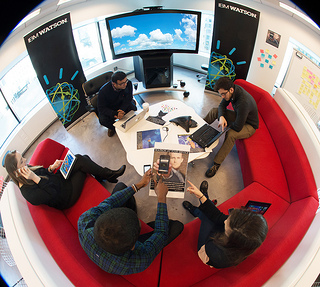6 ways technology helps all enterprises act like startups

Digital technologies are helping even the biggest, lumbering giants become more nimble, analytically focused and adaptive.
That's the view of Accenture, which just issued a report that makes the point that enterprises are increasingly taking on the mannerisms of startups. "The days of innovative, technology-focused start-ups being the only market disrupters and growing faster than their larger, more established competitors may be coming to an end," the consultancy opines.

Of course, you don't hear about Fortune 500 CEOs dipping into their own savings to cover the next week's payroll, or putting their houses up as collateral. But that's another story. The important thing is that larger organizations are making a conscious effort to shed their bureaucratic overhead and knock away their calcified management practices to be more responsive and entrepreneurial.
Technology is making a difference. Give credit to social, mobile, analytics and cloud for making it easier for employees within the bowels of these organizations to pursue and test new ideas without having to get permission and budget first.
Accenture identified six technology trends that are helping large enterprises act more like startups:
Digital-physical blur -- extending intelligence to the edge: "The real world is coming online as wearable devices, smart objects and machines provide us with real-time intelligence, changing how we live and how businesses operate."
From workforce to crowdsource – The rise of the borderless enterprise: "Technology now allows organizations to tap into vast pools of resources around the world, just as companies like MasterCard Incorporated and Facebook Inc. do through organizations such as Kaggle Inc., a global network of computer scientists, mathematicians, and data scientists who compete to solve problems ranging from finding the best airline flights to optimizing retail-store locations."
Data supply chain – changing the way data is handled to put information into broader circulation: "Currently, just one in five organizations integrates data across the enterprise. To truly unlock data’s potential value, companies must start treating it more as a supply chain, enabling its easy and useful flow through their entire organizations, and eventually throughout their ecosystems, too."
Harnessing hyperscale – hardware is back (and never really went away): "Advances in areas such as power consumption, processors, solid state memory, and infrastructure architectures are giving enterprises new opportunities to massively scale, increase efficiency, drive down costs, and enable their systems to perform at higher levels than ever before."
Business of applications – software as a core competency in the digital world: Accenture research shows that 54% of the highest-performing IT teams have already deployed enterprise app stores. IT leaders and business leaders must "transform the app development process, in order to take advantage of new technologies quickly, support regular software iterations, and, ultimately accelerate business growth."
Architecting resilience – "built to survive failure" is the mantra of the non-stop business: "Businesses are expected to support the non-stop demands placed on their processes, services and systems. This has ripple effects throughout an organization, especially in the CIO’s office where the need for always-on infrastructure can mean the difference between “business as usual” and the erosion of brand value."
(Thumbnail photo: IBM Media Relations - IBM Watson Group.)